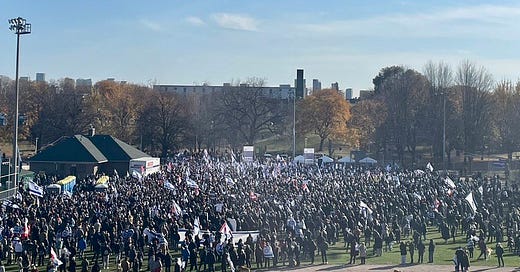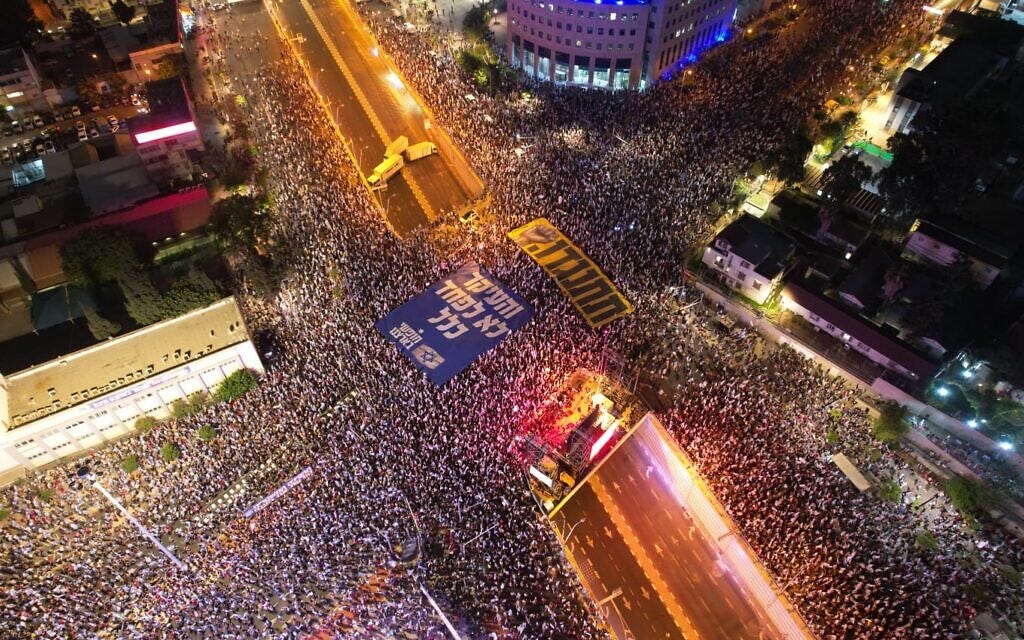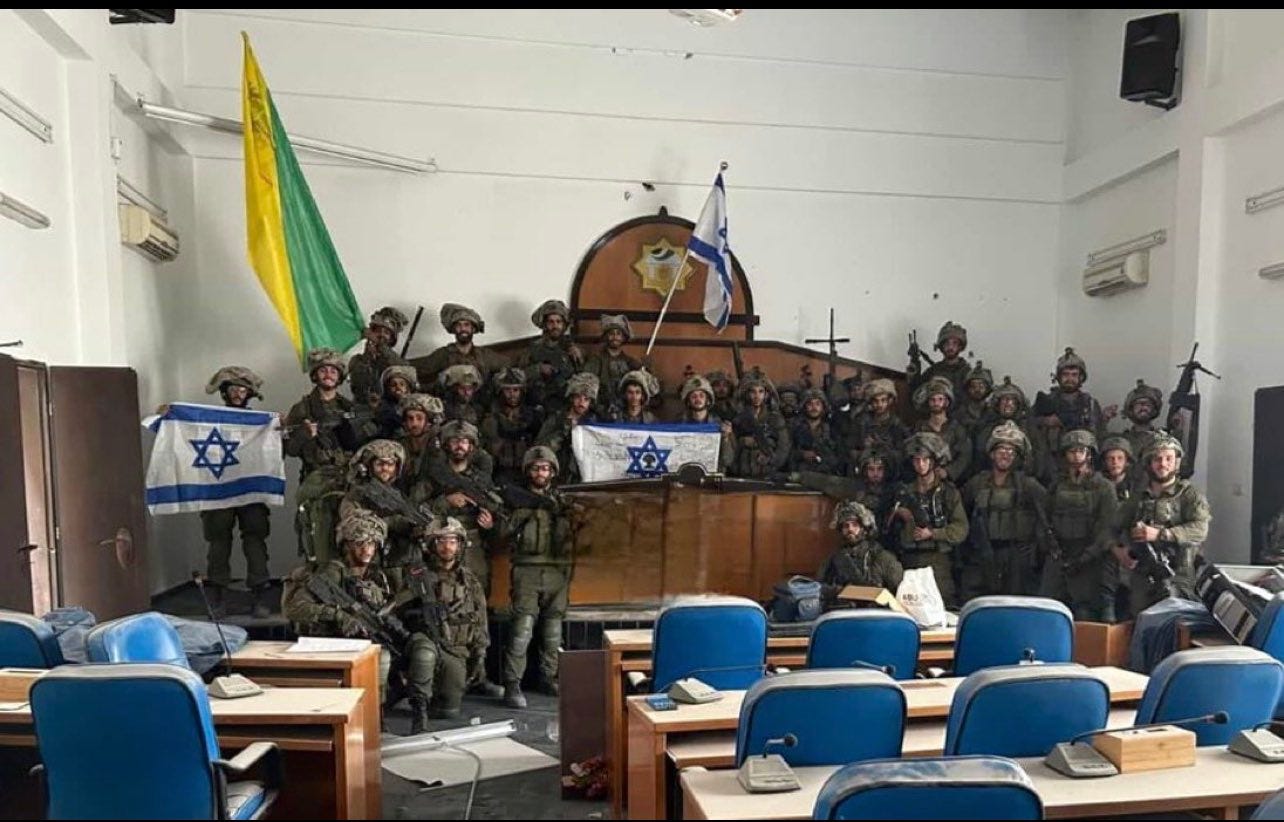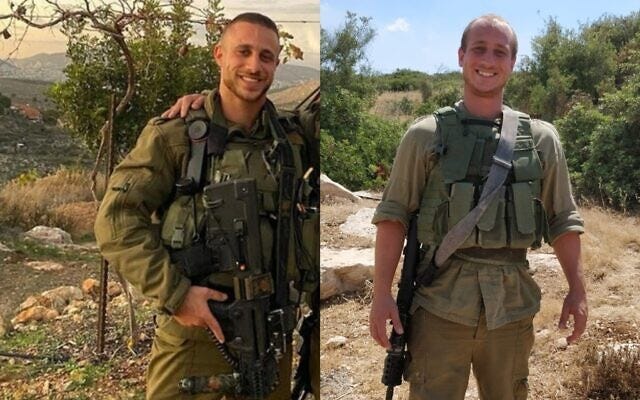Tomorrow, I am flying to Washington DC with a group of a few hundred other Jews to march for Israel. The organizers are calling it “Air Achdus” (unity). There, we hope to meet hundreds of thousands of other Jews from across North America.
Together, we will speak as one. We will thank the American President and Government for supporting Israel. We will ask them to do more. We will show our pride, and our strength. We will not be intimidated by counter protestors. We will sing Hatikvah, and bless the IDF.
Who knows, we may even beat you-know-who’s crowd size on the National Mall.
Six weeks ago
But as we prepare to march on Washington, I think about where we were as a people a mere six weeks ago.
At the time, when we heard about a march, or a protest in our community, it was on the Ayalon Highway in Tel Aviv. It was a march either for or against Israel’s government, and it was a march against other Jews. These marches took place across Israel, outside the Knesset, or outside the Prime Minister’s Residence. Israel was a fractured country, probably more fractured than it had ever been in its history.
Israel’s fracture weakened our Diaspora communities too. We were similarly split along the lines of the judicial overhaul, and were disheartened by what we were seeing take place. I was in Israel at the start of June 2023 for a conference in which we spent the entire time talking about the divisions in Israel, the fraught relationship between Israel and the Diaspora, and what the next 25 years will look like for Israel, until she reaches her 100th birthday. The picture we painted was admittedly troubling.
Countless pieces were written about a potential Israeli ‘civil war.’ That Diaspora Jews were growing wary of Israel. That young Jews were tiring of Zionism. That the previous two Jewish commonwealths (in Biblical times) each did not reach the age of 75, and that perhaps Israel was reaching a point of no return herself. That Jewish sovereignty had a shelf-life.
The situation was grim, and the mood was pessimistic.
Enter Hamas
37 days ago however, Hamas changed the course of Jewish and Israeli history.
On one hand, for the worse. 1,400 of our Israeli brothers and sisters are dead. Our sons were slaughtered, and our daughters were raped. Thousands more are wounded with physical and psychological injuries that will take forever, if ever, to heal. 240 of our brethren are held hostage in Gaza’s dungeons. We learned today that a hostage may have given birth in that hellscape. May G-d bless that child. We do not know of their fate, and we cannot imagine their conditions. Even if saved, the lives of the hostages will never be the same.
Jews across the world today feel less safe than they did on October 6. As Israel furthers its war goals in Gaza, there is an obvious fear of reprisal attacks by Hamas-sympathizers. There are police and security guards outside our institutions.
No good comes of war, and a two-front war with Hezbollah will no doubt lead to more casualties.
No doubt almost every Jewish household feels as though a dark cloud is hanging over it. There is an intensity to the sadness, and the solemnity that we feel.
October 7 was the worst massacre of Jews since the Holocaust. We will never be able to forget what happened.
But
There is a silver lining.
Israel is once again united. To a degree that it has arguably never been before. There is a common mission and goal. There is no longer division along political lines. There is a sense that Israel is fighting for its life, and it is the duty of each and every citizen - young, old, secular, Haredi, Jewish, Druze, Bedouin, and indeed some Arabs - to line up behind their country.
The army has been mobilized. They send pictures from Gaza holding the Israeli flag high, whether on Gaza’s beaches, or in the Gazan legislature, or on the streets in Gaza City, showing their sucesses, singular in their effort to destroy the enemy.
The people of Israel are united. Their unity gives us strength, and we have lined up behind them in a remarkable way. True, there are disparate voices within our community who have taken this opportunity to criticize Israel, or defend its enemies. We will remember who they were, and what they stood for during our grief.
Hamas has also allowed us to see the world for what it is. Perhaps this isn’t a good thing, since it is pretty darn clear that antisemitism isn’t going anywhere. But now we know who are our friends, and who are not. Who we can rely on, and who we cannot. Who will fight for us, and who will not. This is a valuable lesson.
We are Jews
Last night, I heard Rabbi Daniel Korobkin of Thornhill’s BAYT synagogue speak at a Holocaust memorial event. Having just returned from a clergy mission to Israel, he spoke of Rabbi Shmuel Slotki, of Ramot, Jerusalem.
Jews from all walks of life must find ways to stay together. No more divisions, no more in-fighting, no more talk of civil wars. Achdut - unity - is our new undertaking.
Rabbi Slotki lost two sons (out of seven children) on October 7: Master Sgt. Noam Slotki (31), and Sgt. First Class Yishay Slotki, 24. That day, when they heard that terrorists had infiltrated Israel, they both jumped in their cars (despite it being Shabbat and Simchat Torah) and drove to the Gaza Envelope. There, they fought and tragically died at Kibbutz Alumim. They each left behind a wife and a baby, and are today buried next to each other on Mt. Herzl in Jerusalem.
As their father recently said in an interview, “They understood that there was a need to help Israel immediately, that the army was not able to arrive at that time to save the towns near Gaza, and they took on the task themselves. Like many others, they enlisted for this task on their own and without being called…it’s really an incredible thing - the spirit of heroism, the spirit of responsibility, dedication to the people of Israel.”
Rabbi Korobkin noted that, though having grown up in the same family, one brother was secular, and one was Orthodox. That despite the fact that their lives had taken them in different directions, that they ultimately fought and died together, defending Israel. This, Rabbi Korobkin said, is what must empower us today: Jews from all walks of life must find ways to stay together. No more divisions, no more in-fighting, no more talk of civil wars. Achdut - unity - is our new undertaking.
At the beginning of the war, this Twitter user in Israel posted:
In the end, we will win. And in a thousand years there will be another holiday about them trying to destroy us and failing, and the custom (minhag) will be to eat Rachel’s cookies or something.
(This is a reference to Rachel Edri of Ofakim, who fed the terrorists cookies until she was rescued, rather that executed)
Many of us have said the same thing over the last several weeks: we will win, and we will emerge stronger than before. For this, we can at least thank Hamas, while they still exist. They pushed us back from the brink, showed us that we are a people who thrive as a community, and that we have each other’s backs.








